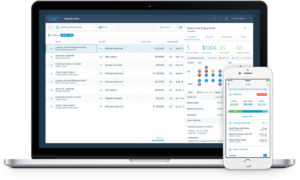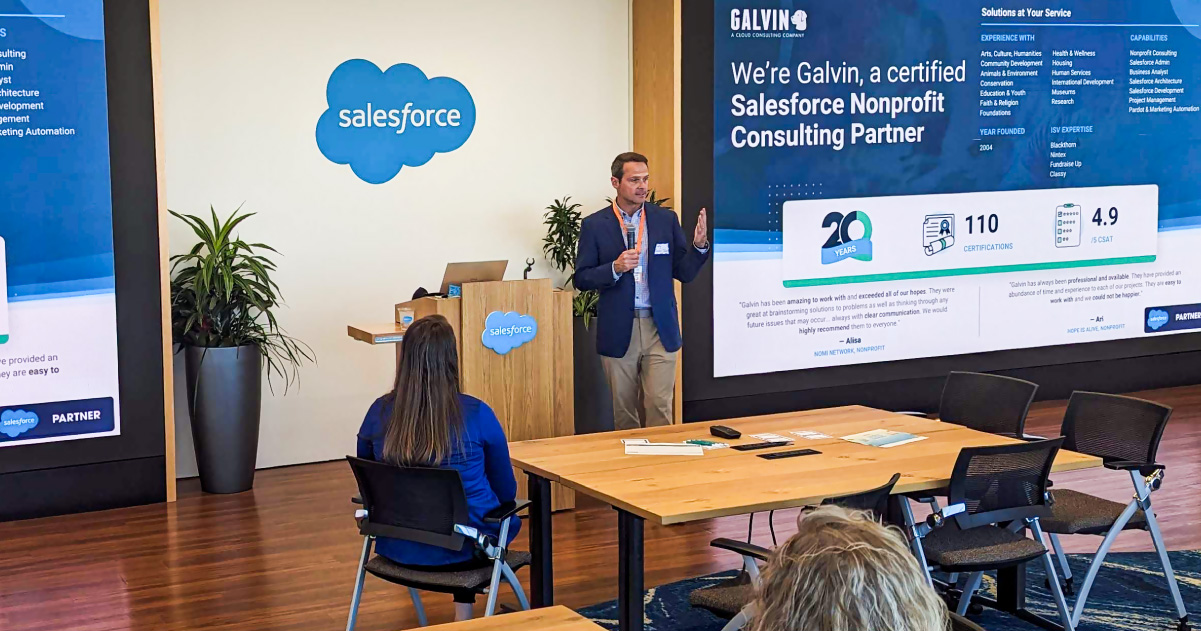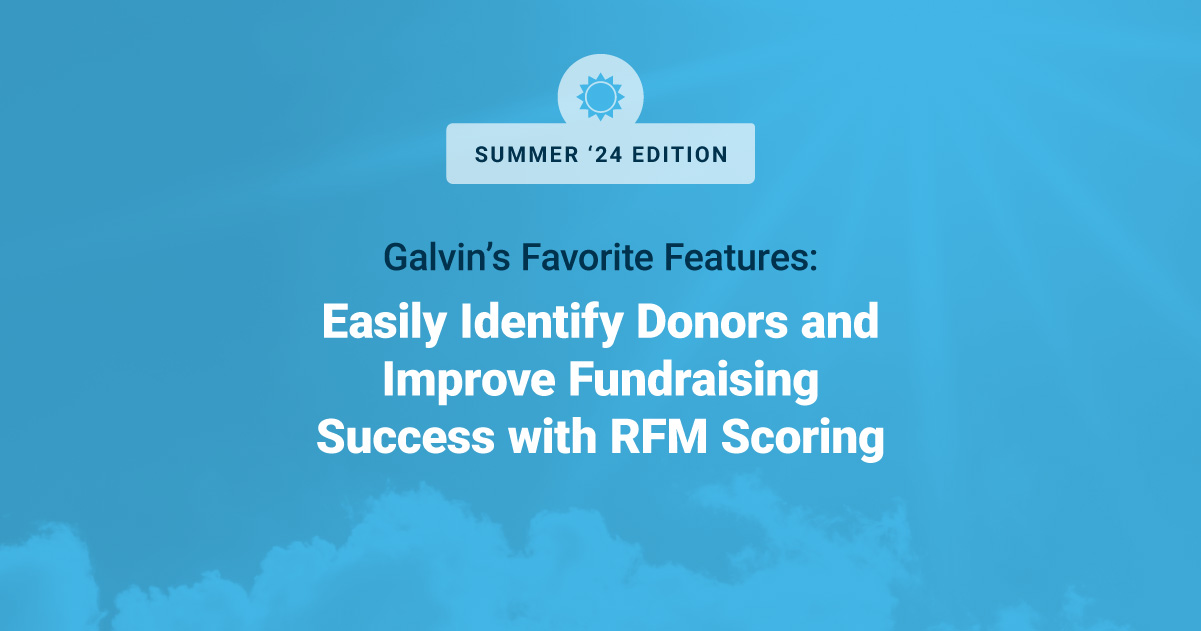How Sales Teams Win with Data Driven Strategies
Too many sales leaders measure the wrong metrics and activities and use old technology like spreadsheets and email to manage their team. Recently, Galvin Technologies and Clari hosted an event for sales leaders called DRIVE: How Sales Teams Win with Data Driven Strategies. We shared what leading sales teams do to accelerate their sales growth. Our morning event started with breakfast and networking and was followed up with sessions that focused on breaking our audience out of their everyday sales routine and challenging them to evaluate new ways of running their sales organization.
We concluded our event with our feature speaker, Bryan Neale, as he shared with us insights and best practices that he has garnished from his 20 years experience as a sales trainer, coach, speaker, and NFL referee. Bryan shared his secrets of elite performance in sales, football, and everything else.
Session 1: Pipeline Challenges Sales Managers Face
Presented by Gary Galvin, Galvin Technologies
Shouldn’t sales people be held accountable too? Too many companies don’t hold sales people accountable. While accounting, operations and other divisions throughout the company have strict accountability metrics it seems sales teams don’t. The reason is because sales managers have not created a culture of accountability and they don’t know what to measure beyond sales revenue.
Sales managers who only track quotas are lazy. When we work with sales organizations on their Salesforce implementation we generally ask sales managers what their sales people are held accountable to and very often we get a “deer in headlights” look with a response that tells us they just have to generate revenue. Tracking how much business a sales person made is the easiest metric to track and its the most exciting metric to achieve. Changing an opportunity stage in Salesforce to “closed/won” involves two clicks of a mouse – EASY. But if this is all the sales managers are tracking then they can’t manage and lead a sales organization effectively.
Sales managers need to be putting more of their focus on pipeline and activity metrics and then hold their sales people accountable to those metrics. When sales managers do this they are able to truly manage and lead their sales people. Here are suggestions we provided to our audience around the pipeline and activity data they need:
- Set a pipeline quota. Typically this quota would be 3x the revenue target. For example, if a sales person has to hit $2 million for the year then their pipeline should always have $6 million or more in it.
- Ensure the pipeline is clean and accurate by creating the following Salesforce reports:
- Number of opportunities past due – this will ensure that as opportunities move through the pipeline the sales person is updating the close date in Salesforce. This will also make forecasting accurate.
- Number of opportunities without a next task – This will ensure opportunities in your pipeline are not getting forgotten.
- Stage Age – Set rules for how long an opportunity can sit in a stage without being moved.
- Win-Loss Ratio – This will calculate your sales person’s “batting average”
- New Opportunities Added Last Week – Sales people need to constantly be filling the sales pipeline.
- Opportunities Set to Close This Week – This will put a focus on making sure we do what it takes to move this across the finish line.
- Create activity metrics. Sales people need to be doing the right activities to fill the pipeline which leads to revenue. Set core activity metrics and track it daily or weekly.
If you’re looking for a template and checklist to help you with your Salesforce metrics download The Ultimate Salesforce Checklist.
Sales managers who only track quotas are lazy. Your pipeline needs measureables. pic.twitter.com/lQbyQE7Ov6
— Galvin Technologies (@galvintech) October 10, 2017
Session 2: How Leading Sales Teams Drive Sales Velocity From Opportunity to Close
Presented by Somrat Niyogi, Clari

Only about half of all sales reps make their quota each year. This isn’t from a lack of trying but rather from a lack of focus on the right opportunities. Sales and marketing teams have rolled out all kinds of technologies to help fill the funnel and then successfully serve the customer. But it’s the pipeline that does not get the attention it needs with sales leaders struggling to get a handle on pipeline health and deal risk. The reason is because sales managers don’t have good and accurate data to manage against and they are typically going off the narrative of a sales person.
The single largest opportunity for sales organizations to transform their effectiveness lies in how they execute their opportunity-to-close (OTC) process.
On average, today’s sales rep spends only a third of their time selling. The rest of the time they are doing data entry and other administrative tasks. This involves tracking who they met with, logging their emails and their calls and other activities their sales managers are tracking. Sales teams are losing velocity because mundane tasks are keeping them from getting in front of prospects where they should be spending their time. .
While sales managers need the activity and opportunity data in Salesforce how can we free up sales people so they don’t have an admin “ball and chain” tied to their ankle? The solution lies in equipping your sales team with a platform that pulls data from Salesforce, email and calendars and combines it into a visual representation that showcases and directs where sales people need to focus their time and attention. Clari is the leading provider of opportunity-to-close solutions. Powered by artificial intelligence, the Clari platform gives sales leaders and executives clear visibility into pipeline risk and upside, and the confidence in an accurate and up-to-date forecast.
The DRIVE event is underway!! Thanks to @clarihq for introducing to Pipeline Analytics pic.twitter.com/1kb5QUuEAG
— Galvin Technologies (@galvintech) October 10, 2017
Featured Speaker: Sales Leadership Lessons
Presented by Bryan Neale, Blind Zebra
At the conclusion of our event we enjoyed an interactive and enriching presentation from Bryan Neale – Sales performance coach and NFL referee. Bryan shared with us lessons he has learned from the NFL and his 20+ years of sales leadership.
Thanks to Bryan Neale for your stories and advice in changing the culture. #STW pic.twitter.com/alrEokQ8Wv
— Galvin Technologies (@galvintech) October 10, 2017
Change the Weekly Sales Meeting
Sales managers have a tendency to manage to the past by asking sales reps what they did last week. They ask questions like “what did you close?” or “who did you meet with?“. This is information that should be readily available in a dashboard and sales managers should already know it. Therefore, sales managers should instead focus their management by leading their sales teams with the following agenda:
- Check In 0-7- on a scale of 0-7 where are you personally and professionally.
- Positive Focus – Tell us two things you did last week that was positive
- Top 2 – What are the top two opportunities or accounts you are working this week.
- Where I am Stuck – What situations are holding you back and lets discuss.
- Input Scoreboard – Lets look at the dashboard and sales metrics
- Deal Work – Focus on the pipeline metrics.
- Accountability – Sales managers have to change their culture and make sure that all sales people are held accountable to their metrics.
- Helps – Where do you need help?
Change the “Victim” Culture
- Abundance – The universe has an abundance of opportunity for you to sell. Meaning there are countless opportunities for you to sell a wide variety of solutions to numerous problems for a nearly infinite number of customers. The glass is always half full.
- Detachment – You cannot sell to everybody. In most cases win rates average 20% so that means 80% of opportunities are not worth your time. The key is to figure out how to more efficiently get to the 20% that best fit you and your solution and detach your time and energy from the other 80%. The instant you become more interested in making the sale than the customer is in buying the solution to their problem then you have become too attached.
We are very grateful that both Clari and Bryan Neale where able to join us for this event and help share how sales teams win with data driven solutions.













